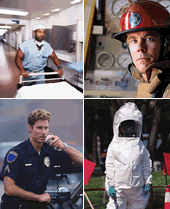Emergency Preparedness Month
Posted on bySeptember is Emergency Preparedness Month. To mark this event, the National Institute for Occupational Safety and Health (NIOSH) announces the new NIOSH Emergency Preparedness and Response Directory web page.
The page will help our stakeholders find resources faster and easier for preventing injury and illness among responders in the line of duty. The web page is coordinated by the Emergency Preparedness and Response Office (EPRO) in the NIOSH Director’s Office. EPRO has three main goals: (1) to be the Institute’s focal point for technical expertise on our area in emergency preparedness and response (protecting emergency responders), (2) to help with rapid and specific on-site support, and (3) to advance research into emergency preparedness and response to better safeguard responder safety and health in the line of duty, and promote collaborations that enhance current efforts.
This work has included support and new knowledge for responder safety and health associated with responses to Gulf Coast hurricanes, Deepwater Horizon response, Southeast Asia tsunami recovery assistance, anthrax and ricin incident responses, BioWatch and biohazard detection system alarms, and response supporting U.S. Border security. Through these efforts, EPRO supports NIOSH’s mission and expertise in responder safety and health.
EPRO is coordinating NIOSH participation, specific to NIOSH’s mission of advice and guidance for protecting health care workers and responders from job-related risks, as part of the United States Centers for Disease Control and Prevention’s (CDC) response to the Ebola outbreak in five African countries. NIOSH’s activities include the following:
- Helping occupational groups select and use personal protective equipment and other protective measures.
- Reviewing and clearing guidance documents and communication materials.
- Coordinating with other federal agencies, World Health Organization, and volunteer groups on occupational safety and health.
- Responding to questions from businesses on how to protect their employees during emergency situations.
- Coordinating deployment and volunteer opportunities for NIOSH staff.
- Helping develop a process to safely deploy CDC staff worldwide.
- Giving healthcare facility design and engineering support for treatment facilities in Africa.
The office and its partners have published documents based on these responses, including the National Response Team Technical Assistance Document: Emergency Responder Health Monitoring and Surveillance (ERHMS) and A Guide for Key Decision Makers. These documents address the need for health monitoring and surveillance of emergency response workers. Another document, Guidance for Protecting Responders’ Health During the First Week Following a Wide-Area Aerosol Anthrax Attack, teaches first responders about protective actions during an anthrax release incident.
ERHMS developed training courses to help those who plan and execute incident response activities. All of these publications can be found on the NIOSH Emergency Preparedness and Response Directory web page. The directory page offers improved access to NIOSH topics and publications on responder safety and health, natural disasters and hazards, and NIOSH disaster response efforts. The directory also links to the Emergency Preparedness and Response Program Portfolio and other related NIOSH programs. Governmental emergency response resource listings are also provided along with listings for state, local, tribal, and territorial agencies. Visit the Emergency Preparedness and Response website, and be better prepared!
Michelle R. Martin, MS
Ms. Martin is a Public Health Advisor in the NIOSH Division of Respiratory Disease Studies.
10 comments on “Emergency Preparedness Month”
Comments listed below are posted by individuals not associated with CDC, unless otherwise stated. These comments do not represent the official views of CDC, and CDC does not guarantee that any information posted by individuals on this site is correct, and disclaims any liability for any loss or damage resulting from reliance on any such information. Read more about our comment policy ».



Nice post. Thanks
An emergency is a situation that poses an immediate risk to health, life, property, or environment.[1] Most emergencies require urgent intervention to prevent a worsening of the situation, although in some situations, mitigation may not be possible and agencies may only be able to offer palliative care for the aftermath.
While some emergencies are self-evident (such as a natural disaster that threatens many lives), many smaller incidents require that an observer (or affected party) decide whether it qualifies as an emergency. The precise definition of an emergency, the agencies involved and the procedures used, vary by jurisdiction, and this is usually set by the government, whose agencies (emergency services) are responsible for emergency planning and management.
“Emergency Preparedness is the discipline of dealing with and avoiding both natural and manmade disasters.”[1] It involves mitigation, preparedness, response and recovery in order to lessen the impact of disasters. Emergency management requires a partnership among all levels of government (local, State, and Federal) and the private sector (business and industry, voluntary organizations, and the public).[2] Successful preparedness requires detailed planning and cooperation among each sectors. Emergency preparedness ranges from the Federal Emergency Management Agency (FEMA) developing an all inclusive plan to mitigate natural disasters to the individual ensuring their car has plenty of fuel for a possible evacuation.
We are doctor from Indonesia fully supporting NIOSH on there
Good working on there..
It’s great that attention is being called to getting better prepared, especially for large agencies that can do much, but there should be more effort to reach and teach individuals as there are some very basic actions that can be taken such as storing water for a few days.
nice posting
This work has included support and new knowledge for responder safety and health associated with responses to Gulf Coast hurricanes.
Nice Initiative.
With Regards
Richard
Good working & nice posting
It’s nice to see that events like this continue to go on. Over at [removed] we wholeheartedly support those that seek to maintain a prepared way of life.